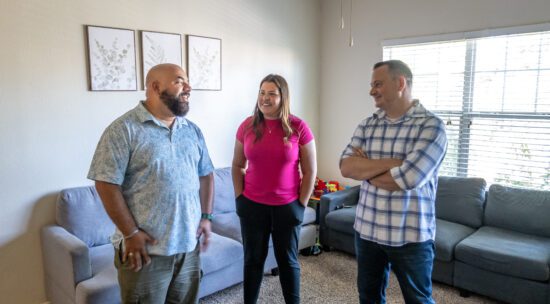Brenna and Grove Norwood have given their lives to remembering those who are in prison (Heb. 13:3) through The Heart of Texas Foundation. Together with their staff, donors, and other partners, Brenna, the director of programs, and Grove, the CEO, watch God transform men and women in the midst of very difficult circumstances. The work is not easy, but it is a testament to what God will do when Christians obey his Word by carrying the gospel to and caring for those among us who are in great need — physically and spiritually. Below, Brenna answers a few questions about prison ministry and how Christ brings light and hope to the darkest of places.
Lindsay Nicolet: Tell us a little bit about the Heart of Texas Foundation and what led to its inception?
Brenna Norwood: The Heart of Texas Foundation was born out of a desire to serve those who have nothing to give back in return and the literal poor. In the earliest days, it began with Grove asking in every part of the community, “Who is the poorest person you know?” In the process, we began to visit prisons because the Lord clearly commands us to remember the prisoner.
LN: How did the Lord lead you into prison ministry?
BN: Our church was volunteering in prisons. By going, we began to learn how the church interacts with the corrections system and how the corrections system thinks and works. It became clear that there are prisons within prison, such as the inner prison referred to in Acts 16:24 which Paul and Silas experienced. In addition, most programming offered for the prisoner is understandably focused on men and women who are finishing their sentence.
Programming and access to men and women in the inner prison and those with long prison sentences remains minimal, yet this is where our work lies. We are occasionally still asked by those we serve who might not yet know the Lord, “Why do you keep coming back?” Our answer truly is in 2 Corinthians 5:13-15, specifically the love of Christ compels and controls us.
LN: The hallmark of your foundation is the Texas Field Ministers program. What comprises this program?
BN: The Texas Field Ministers Program focuses on men and women with extremely long prison sentences. It consists of two related parts: 1.) Education and 2.) Service. The men and women who are our students in The Heart of Texas Foundation | College of Ministry pursue the Bachelor of Arts in Applied Ministry. Upon graduation, they are sent in teams of two or more to serve as Field Ministers for the remainder of their sentence, an official job title within the Texas Department of Criminal Justice that allows them to reach men and women in the inner prison.
LN: What led to the focus of the foundation being education in ministry? Why is this so important?
BN: Prisons are full of men and women who caused great harm. They are full of men and women who have been the recipients of great harm. The Texas Field Ministers Program allows an entirely new identity to exist for the man or woman with a long prison sentence — an identity other than the crime they committed, the peer-to-peer inmate culture, or the mentality brought on by institutionalization. If a man or woman has a long prison sentence, how can they show that they have met the rehabilitative goals of society or the prison system itself if they are not given the opportunity to display such evidence on a daily basis? The Bachelor of Arts in Applied Ministry takes four and a half years to complete. We developed the 42-course curriculum after 10 years of experience in this work specifically to give men and women time to learn, grow, and prove they can be trusted with an opportunity to serve others as a Texas Field Minister.
Even though men and women are familiar with the environment they are living in, that alone does not equip them to minister effectively in the storm of trauma and life they run into amongst their peers. To impact the culture of the prison for good and for the Lord, that takes equipment, support, and time met best through excellent Christ-centered education from godly men and women of integrity relying on the Lord for his ultimate work in each student’s life. Our United States Coast Guard, for example, has a rescue helicopter and crew equipped for the most extreme conditions. While they won’t use everything they know in every situation, everything they know will serve them well in any situation. That’s why education — Christ-centered discipleship is important for Texas Field Ministers equipped with the gospel to go into the darkest of places.
LN: How have you seen the Field Ministers program transform the lives of prisoners?
BN: Men and women have come to faith in Christ among the student body. Men and women share the good news of Jesus Christ with others in an informed and relational way such that the body of Christ is strengthened in a manner that volunteers alone cannot do. Men and women in the Texas Field Ministers Program have credibility with their peers so long as they maintain a consistent lifestyle.
The good news of Jesus in the hearts of men and women creates ripple effects of his goodness and order. The men and women we serve consistently begin to reach out to their children in a new and unselfish way (Malachi 4:6; 2 Corinthians 5:18-21). Every crime creates a ripple effect — the victim of the crime, the family of the victim, the family of the perpetrator, and society. Studies show that 7-8 out of 10 children will follow their parent into prison. The gospel can change that. We have witnessed that many, many times.
LN: Why should Christians care about and for prisoners? What does the Bible say about it?
BN: Four books of the New Testament were written by Paul from prison. The Lord commands us to remember the prisoner in Hebrews 13:3 and sees when we do according to Matthew 25:36. Spiritually speaking, prison is a state that we are all in before Christ according to Galatians 3:22, mercy from which we can only receive from God according to Romans 11:32. We cannot escape the reality of prison. The Lord builds this into every human life.
When we visit the prisoner in the name of Christ Jesus, his grace is built into that visit so that it is a blessing not just for the one in prison, but for the visitor as well. Prison is an awful, dark place, yet the light of Christ shines brightly there among those who are his. It’s not easy to go. Going has a way of refining all of your deepest held beliefs about life. We have found that only Christ and the work of the cross restores us after each visit.
LN: How would you advise Christians who have a desire to serve in prison ministry but don’t know where to start?
BN: There are so many faithful men and women in the body of Christ visiting the prisoner without fanfare — just beautifully faithful. Prayerfully ask and seek those who are already doing some of the work. Where you begin might not be where the Lord leads you to serve ultimately. Ask questions. Be willing to learn. Be willing to listen. When you go, respect the authority on the prison unit. You will encounter a broken, slow system, but the prison system has reasons for why they do everything, primarily having to do with safety and security including yours — respect the authority that is there. That authority begins with the newest correctional officer. Expect to serve and not be served from the time you enter the parking lot to the time you leave.
LN: What are some of the misconceptions about and challenges of ministering to prisoners? And how can Christians have a correct view of prison ministry and faithfully steward this calling?
BN: Misconceptions regarding prisoners are many: 1.) That prisoners are lower in intelligence or in their ability to learn (However, it is true that literacy levels are very low in prison across the population, but literacy is not an intelligence issue. So often, it’s an instructional casualty issue or a casualty of a life of the chaos one did not choose to grow up in.) 2.) That they must all be from the same socioeconomic background and therefore race must not be as big as an issue. Times have changed; if you asked your church family for a show of hands if they have someone in their family who has been incarcerated in the criminal justice system on any level, many hands would go up that might be surprising.
Misconceptions about prison ministry might be summed up in that prison ministry is not for the weird, biker-type Christian or the former drug addict. Every Christian is called to visit the prisoner. Remember those bound in chains. According to Christ, we may very well end up there ourselves just for following him. We can learn a lot from Paul who said that nothing but prison and hardships awaited him. “But I do not account my life of any value nor as precious to myself, if only I may finish my course and the ministry that I received from the Lord Jesus, to testify to the gospel of the grace of God” (Acts 20:24).
LN: What are some of the greatest needs of prisoners, and how can Christians rise up to help meet some of them?
BN: They need the body of Christ to come and visit them. They need a Field Minister — a mature man or woman of God living beside them who can help them in their greatest hour of need at any time of day. They need the gospel deeply planted in their hearts and minds. They do not need people to feel sorry for them; they need people to love them unselfishly with the love of Christ who keep coming back to visit them — the impact is in the returning.
LN: If someone wanted to start something like this in their area, how would they begin?
BN: Call us, we would love to talk. 281-850-8103 or [email protected]. You can do it with the Lord’s help and a few careful, prayerful steps. North Carolina, Wisconsin, Oregon, and Texas all have experience; we are colleagues in the work each of us is a part of in our states. We would be glad to connect you with our peers.










